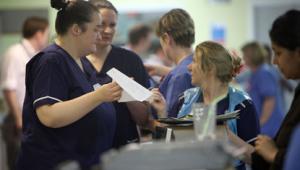By Vivienne Russell | 4 June 2013
The majority of NHS finance directors think the health service will fail to meet its target of £20bn 'efficiency savings' by 2015, according to a King’s Fund survey.
Of the 51 finance directors polled by the health think-tank, 90% said they expected to end the 2012/13 financial year in surplus. But a greater proportion – 96% – estimated that the risk of the NHS failing to meet its £20bn efficiency target was 50:50 or worse.
In terms of patient care, 40% of finance directors believe the quality in their area has deteriorated over the previous year, and more than two-thirds (69%) that the government’s reforms had had a negative impact on performance.
According to the King’s Fund, this pessimistic outlook reflects the degree of financial pressure the NHS is facing. Savings so far have largely come from staff pay freezes and cuts in management costs. ‘With these savings increasingly difficult to sustain, further productivity improvements will become harder to deliver without changes to services,’ the fund said.
‘The pressure will be exacerbated by cuts in funding for social care. More than two-thirds of finance directors identified reductions in local authority funding as affecting their trust last year.’
The survey was published alongside the King’s Fund’s latest quarterly monitoring report on the NHS. This showed that the number of people who have waited more than four hours in hospital accident and emergency departments has hit a nine-year high.
According to statistics for the three months to March this year, 313,000 patients (5.9%) spent four hours or more waiting to be seen by A&E staff. This is the highest level recorded since 2004.
It also means that the government has missed its target of no more than 5% of patients enduring four-hour waits since Prime Minister David Cameron promised in June 2011 to keep emergency waiting time low.
Commenting on the figures, King’s Fund chief economist John Appleby said: ‘Emergency care acts as a barometer for the NHS. The worryingly high number of patients waiting longer than four hours in the last quarter in 2012/13 is a clear warning sign that the health system is under severe strain.’
He added that relieving pressure on A&E would require a co-ordinated response across the whole health system.





















